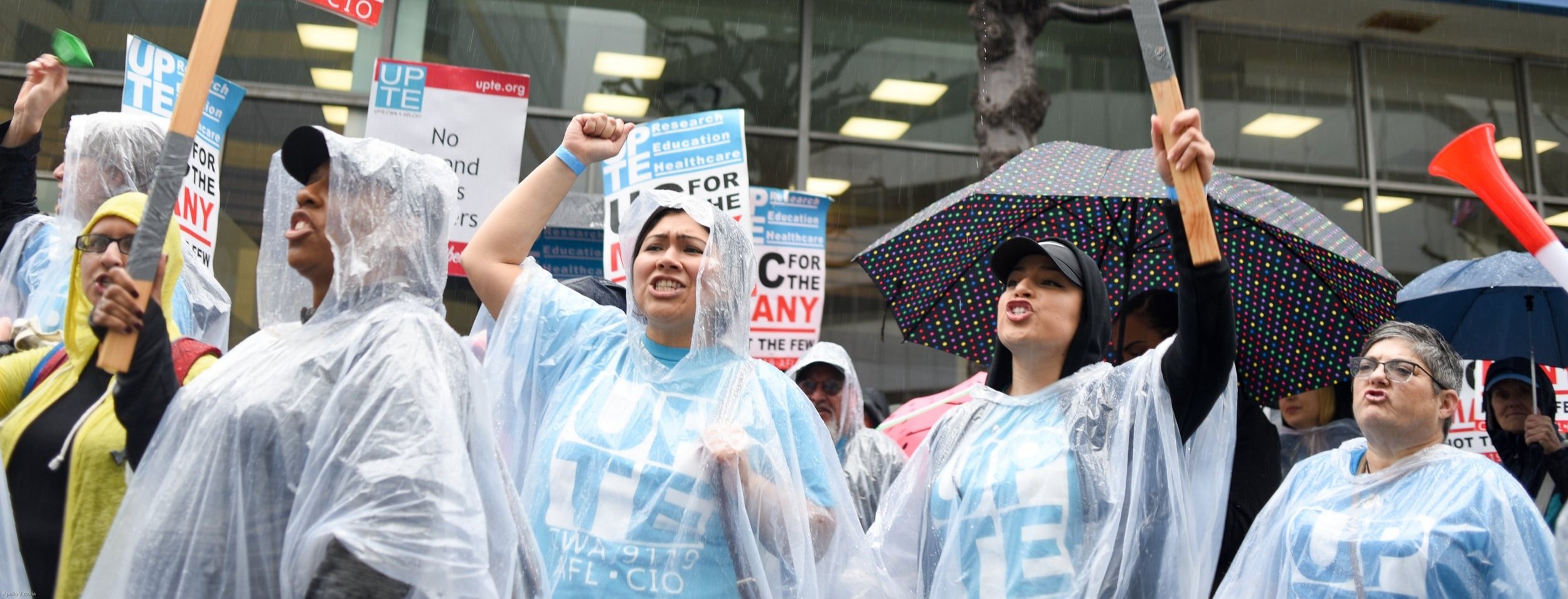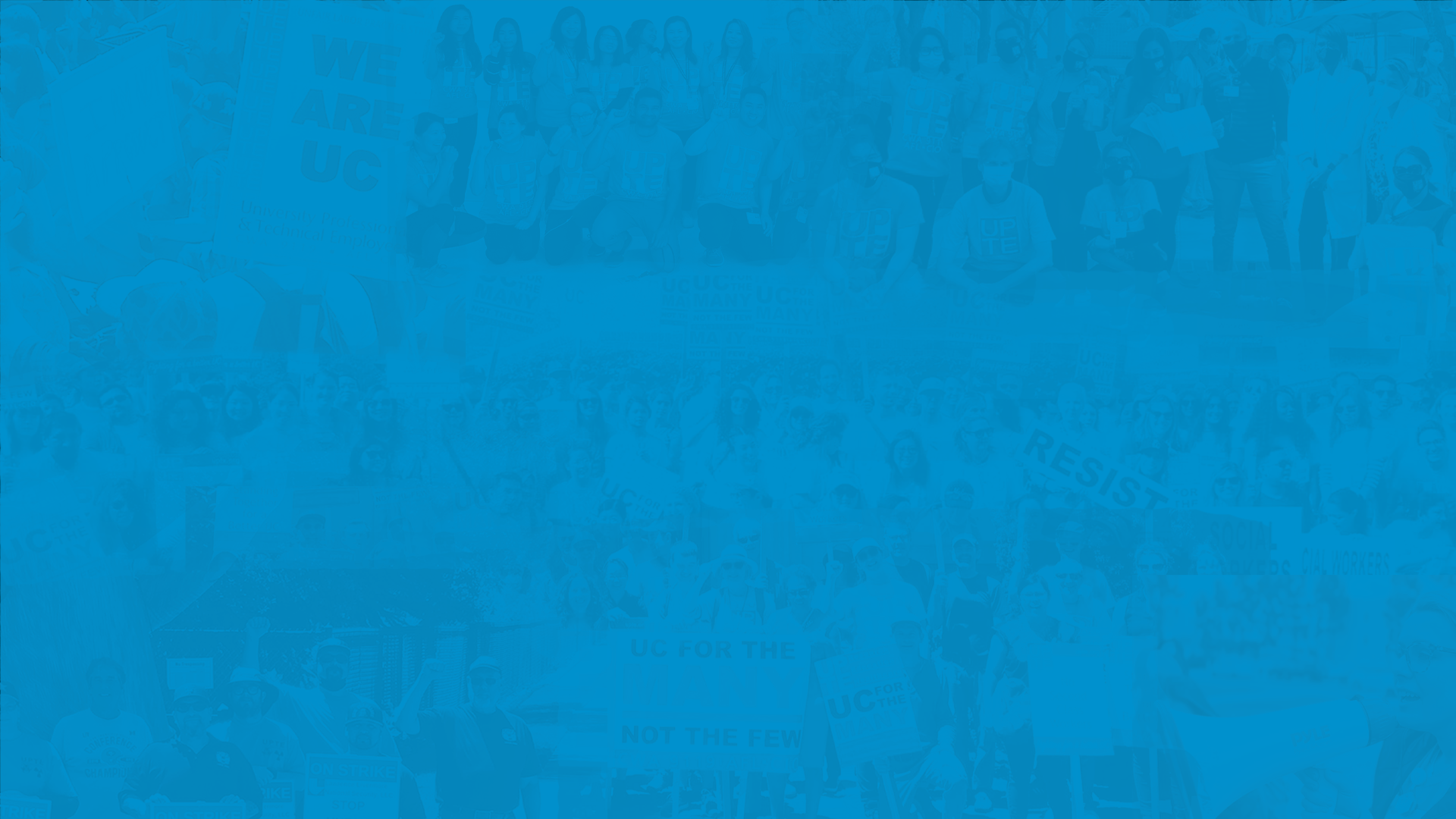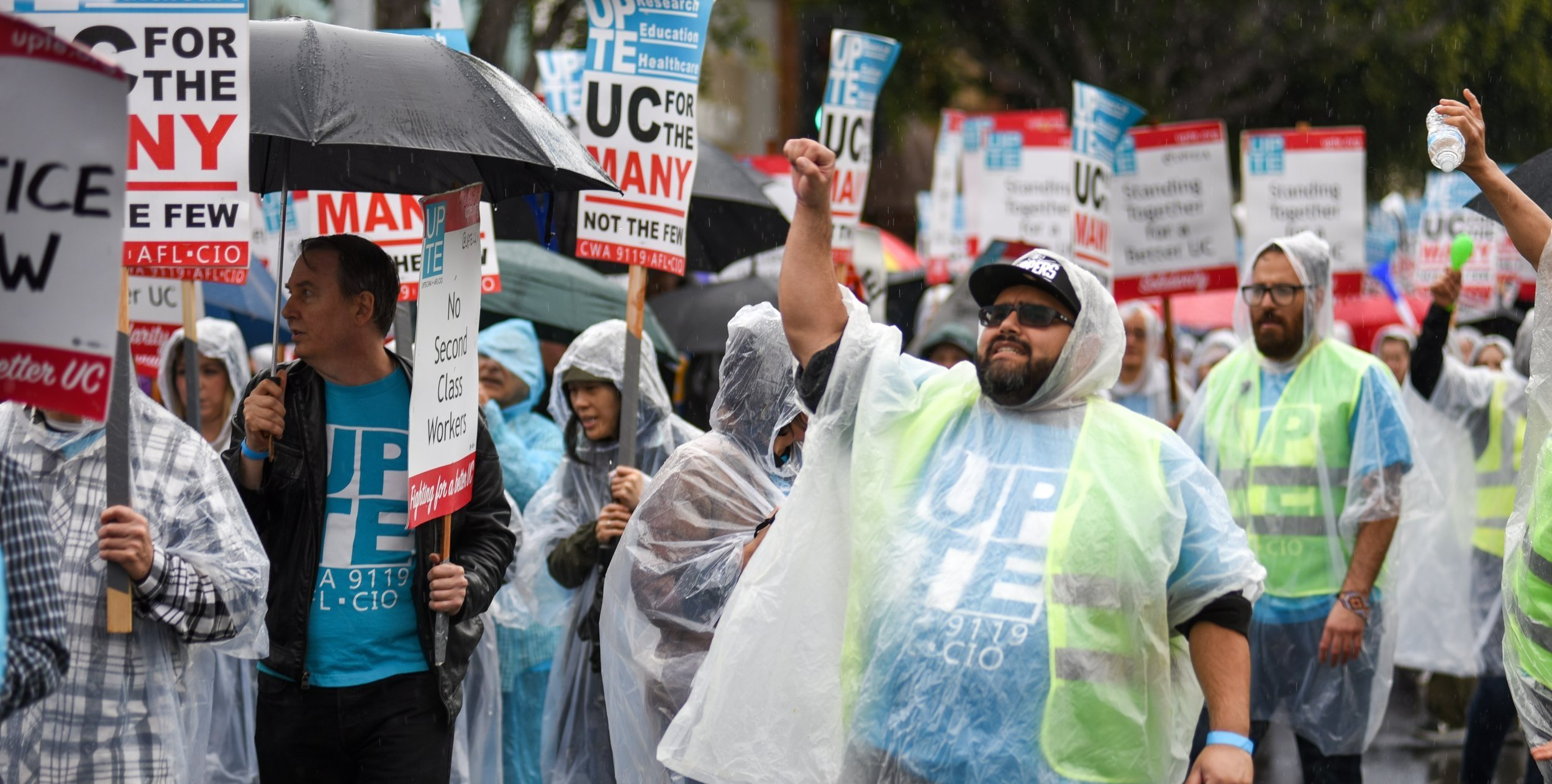
UPTE members are fighting and winning
across California
As we continue our fight for a fair contract, UPTE members are also fighting and winning on issues that matter to us in workplaces all across the state.
With UC's new President James Milliken a few days into his tenure, we hope he will choose a new path for our negotiations—but we continue to get strike-ready if UC continues its bad faith bargaining.
Every UPTE member who has stepped up to fight back against UC's poorly thought-out policies, short-sighted layoffs, and other overreaches is showing UC that we won't back down in our fight for our patients, research, and students. Together, we are holding UC accountable to its mission of serving all Californians.
Check out these recent fights and victories:

Latest News
UPTE and the University have completed the final steps of the state-mandated impasse process with the release of a report by a neutral arbitrator. The report is not binding on either party: it is intended to help reach agreement but does not restrict UPTE's right to strike in order to win our demands.
Fact finding reports typically recommend the status quo and UC was unable to make such a case for their proposal to remove healthcare premium caps, leading the fact finder to conclude:
"This credit-based model does not exist in any other UC collective bargaining agreement. All comparator unions rely on premium caps or tiered structures—not flat monthly credits—to manage cost exposure. Furthermore, UC's proposed model lacks a cap on total employee premium increases, meaning that even with the credit, employees could face unbounded financial liability."
In 2019, the fact finder recommended against UC's proposal to cut the pension for new hires and remove healthcare premium caps. It was not the fact finding report that moved UC but thousands of UPTE members going on strike. Click here to RSVPfor our webinar on Tuesday, July 22nd at noon to hear more about the next steps in our fight!
Research and Development Engineers (RDEs) are among some of UPTE’s newest members across the state—and they’re already wracking up some major wins through their newfound collective strength!
Shortly after joining UPTE, UCSD shifted RDEs to exempt overtime status, removing a vital form of pay that they had been receiving. These new members were eager to fight back—they put their heads together, then called for a meeting with Labor Relations to make their case. UCSD agreed to provide equity adjustments for impacted RDEs, resulting in salary increases of $10,000+ per person to account for average overtime hours.
But that’s not all—when four RDEs were wrongfully laid off and treated as if they were non-union, UPTE members once again sprang into action. Together, we alerted Labor Relations that these workers were now UPTE-represented, submitted an RFI, and met with UC leadership. As a result of our efforts, all four layoffs were rescinded.
With UC experiencing a crisis of leadership, these victories make all the more apparent the power we have together in our union.
Short-staffing, weekend shifts, missed meals and bathroom breaks, and now mandatory overtime? If it were up to UC Irvine management, this would have been the reality for clinical laboratory scientists at UC Irvine. There was just one thing missing from their calculus—the collective power UPTE members have in our union.
When workers got the notice announcing that management was asserting the right to implement mandatory overtime, forcing these people into unexpected 10-12 hour shifts, we said no way. UC’s justification? That people were taking too much sick time. What did they expect after months of working people ragged due to inadequate staffing?
The stakes are high. When people are overworked and understaffed, mistakes happen—and not small, routine mistakes, but potentially a patient receiving the wrong kidney or something similarly serious and potentially life-threatening.
UPTE members immediately got organized. We circulated a petition in our laboratory which garnered overwhelming support and outlined the dangerous risks for patients and the tremendous personal toll that these policies were having on workers.
For the past year, the leadership of one of the studies in the Division of HIV, Infectious Disease, and Global Medicine had been extremely hostile towards clinical research coordinators.
Despite a heavy workload for the team, management continued to invest in the expansion of the managerial team rather than investing in more CRCs. Moreover, the direct CRC supervisor had no knowledge of the workflow of the team, did not contribute to study enrollment or study visits, and overall seemed to have a superfluous role other than to micromanage the team’s work.
The final straw for the team came when NIH funding cuts began to affect the team, and the management team opted to lay off the most senior team member rather than the manager.
In response to this situation, members of multiple teams across the Division of HIV, as well as Ward 86 Social Workers and wet lab workers, marched on their boss to push back, delivering a petition with overwhelming support and highlighting issues on the team.
We demanded a labor management meeting to discuss the situation and that same day, a Labor and Employee Relations representative got in touch with us to schedule the meeting.
One of my worst fears came true earlier this year. UC laid me off from my job as a systems administrator out of the blue, leaving my wife and me scrambling. It was a complete shock—I was going to lose my job of twenty-plus years in two months. What about our kids? Our mortgage? Food, healthcare, retirement?
Fortunately, that's not the end of my story. As soon as I got my layoff notice, I contacted my organizer. We began fighting my layoff immediately, and eventually, we won. After months of bracing for the worst, I was back to work just weeks after my "final" day. This is the power of being willing and able to stand up against unjust decisions in the workplace. This is the power of having and enforcing a strong contract with layoff protections. This is the power of our union.
UC's reasoning for my layoff was budget concerns. The funding sources for our department were either being held up somewhere or had been cut at the federal level. Yet, in the months-long stretch between when I received my layoff notice and my last day, I found out that both funding sources were reinstated.
Crisis over, right? Wrong. UC was still planning to lay me off. Without UPTE, I would have lost my job without recourse, even though I knew there was no logic behind the decision.
As an Animal Health Technician 3 at UC Davis’ Veterinary Medical Teaching Hospital (VMTH)—ranked the country’s top animal hospital—I am proud of the world‑class care our teams strive to provide. Yet you and I both know reputation alone doesn’t keep patients safe. Regional specialty and emergency clinics now pay up to $15 more per hour than UC Davis, and chronic understaffing means two techs can be responsible for more than sixty ICU patients. Emergencies are turned away, preventable tragedies occur, and the stress is driving talented colleagues out the door.
Sound familiar? Whether you’re at UC Davis, UC San Diego, UC San Francisco, UC Riverside, or any other campus‑based clinic, many of us face the same retention, recruitment, and workload crises. That’s why I’m writing to share what we achieved together in Davis last week.
On Tuesday, July 29, animal health technicians, animal technologists, and other UPTE-represented workers at UC Davis joined an informational picket outside the School of Veterinary Medicine to demand safe staffing.
Media response was immediate: FOX40, The Sacramento Bee, The Davis Enterprise, and others amplified our call that safe staffing saves animal lives.
The Medi-Cal Behavioral Health Student Loan Repayment Program is a state-run program designed to support behavioral health professionals with student loan debt. This loan repayment program is only for behavioral health professionals with educational debt who commit to serving two to four years in Medi-Cal safety net settings such as FQHCs, Community Mental Health Centers, Rural Health Clinics, or hospitals/behavioral health sites with 40%+ Medicaid/uninsured population. Applications are due by August 15, 2025, at 3:00 p.m.
Eligible applicants include licensed prescribing and non-prescribing practitioners, associate-level pre-licensure providers, and non-licensed professionals, and they must provide qualifying services under the California Medicaid State Plan.
Please note that this program is administered entirely by the State of California, not UPTE. Our role is simply to share this opportunity with you. UPTE is not involved in application decisions, approvals, or enforcement of the program's requirements. If you have questions about the program or your eligibility, we encourage you to contact the state directly through the program's website.
UPTE met with UC on July 8 and 9, where UC provided "a new package of proposals" that includes no raises in 2028, no limits on increases to healthcare costs, no increased time off, and no right to vacant positions prior to layoff.
The most meaningful improvement was UC agreeing to UPTE's proposal to expand preferential rehire rights from just someone's home campus (e.g., UCSF) to all UC campuses and extend recall and rehire rights for HX unit members to three years for those with more than ten years of service (matching the RX & TX bargaining units). However, UC proposed reducing recall and rehire rights for those at Berkeley Lab (LBNL) from three years to one year, without providing an explanation.
Check out a summary of UPTE's proposals compared to UC's here.
This is all two months after our last bargaining session, demonstrating that UC is still not taking the ongoing crisis of recruitment and retention seriously. We have now missed a step increase and an across-the-board raise due to UC's stalling and unfair labor practices.
As UC sows confusion and misinformation about supposed 'financial constraints' while spending tens of billions on expansion and new construction, it is more important than ever that we hold the line on these issues.
On June 23rd, UC San Diego Health announced the layoff of 230 employees, including a handful of UPTE-represented workers. Immediately following the announcement, UPTE sprang into action.
With little notice, over 200 members attended an emergency meeting in La Jolla and received widespread media coverage that made it clear to UCSD leadership that UPTE members would not sit by quietly. UPTE workplace and unit representatives talked to their coworkers and discussed a strike if UCSD refused to work with us.
Thanks to our powerful presence in the past three strikes, UCSD recognized our strength and has committed to resolving a majority of the UPTE layoffs. We are continuing to fight every layoff and will not stop until every option has been exhausted.
As a result of this progress, UPTE will not be striking on July 22nd. We stand in solidarity with AFSCME in their fight against layoffs and ask all members to show support by wearing solidarity stickers and joining their picket lines during breaks. AFSCME was hit with 103 layoffs, roles essential to hospital operations and patient care, and we will stand beside them in their fight.

UPTE-CWA 9119 is the union of professional and technical employees at the University of California.
UPTE was founded in 1990 by a group of employees who believed that UC workers would benefit from a union to safeguard and expand our rights. In 1993, UPTE members voted to affiliate with the Communications Workers of America (CWA), a 700,000-member union in the American Federation of Labor and Congress of Industrial Organizations (AFL-CIO), the largest federation of unions in the United States, to better represent our members.









